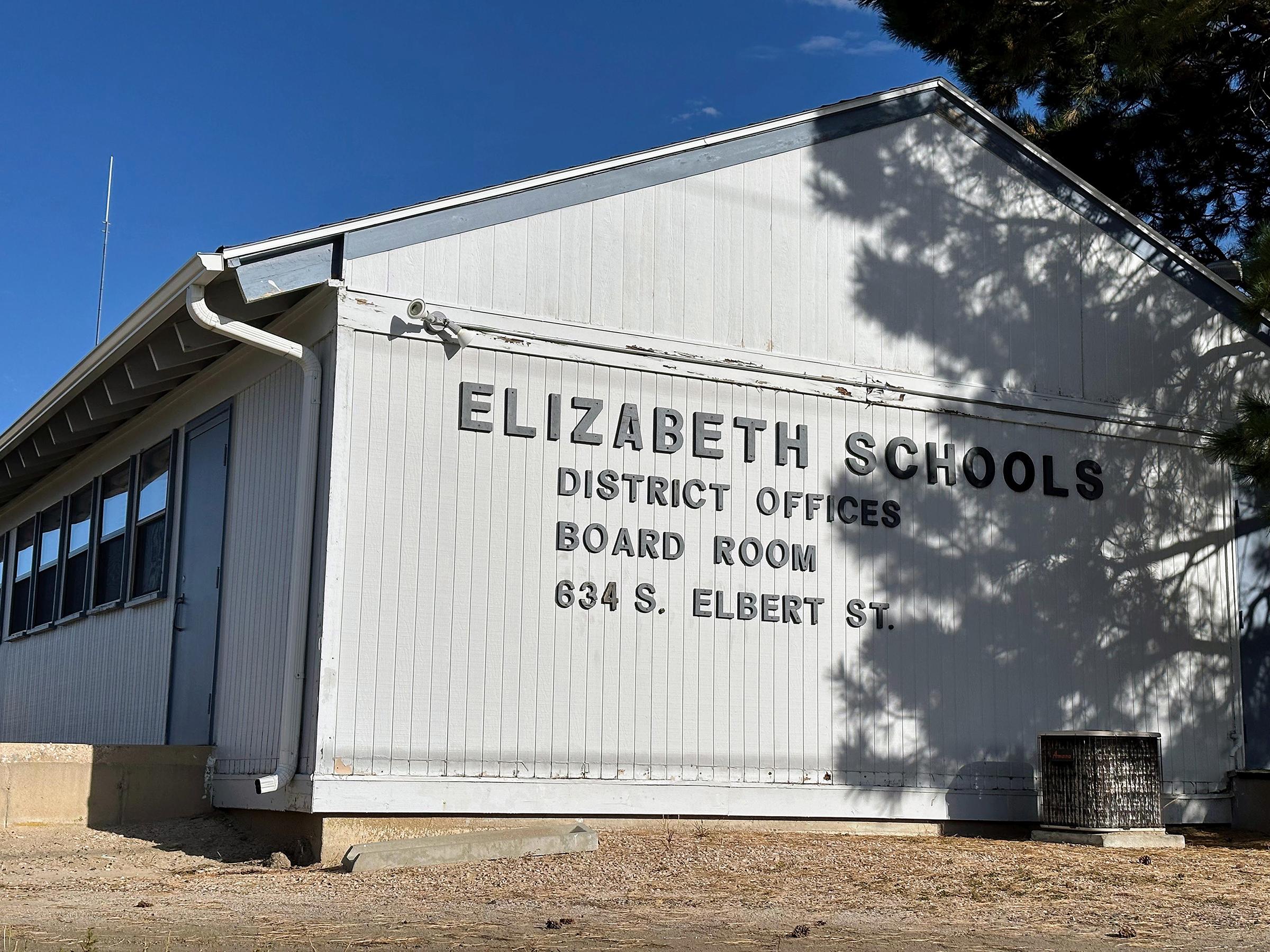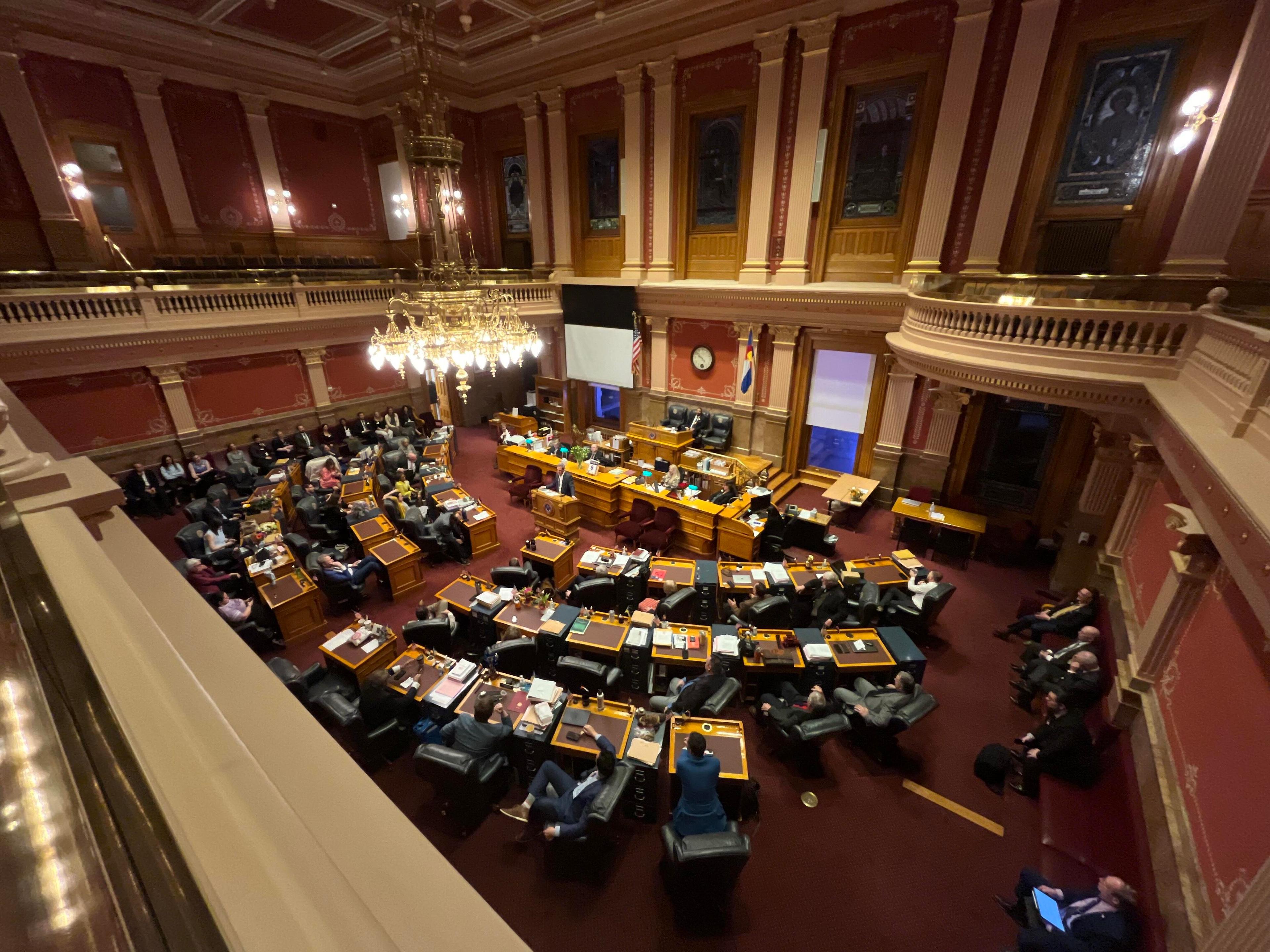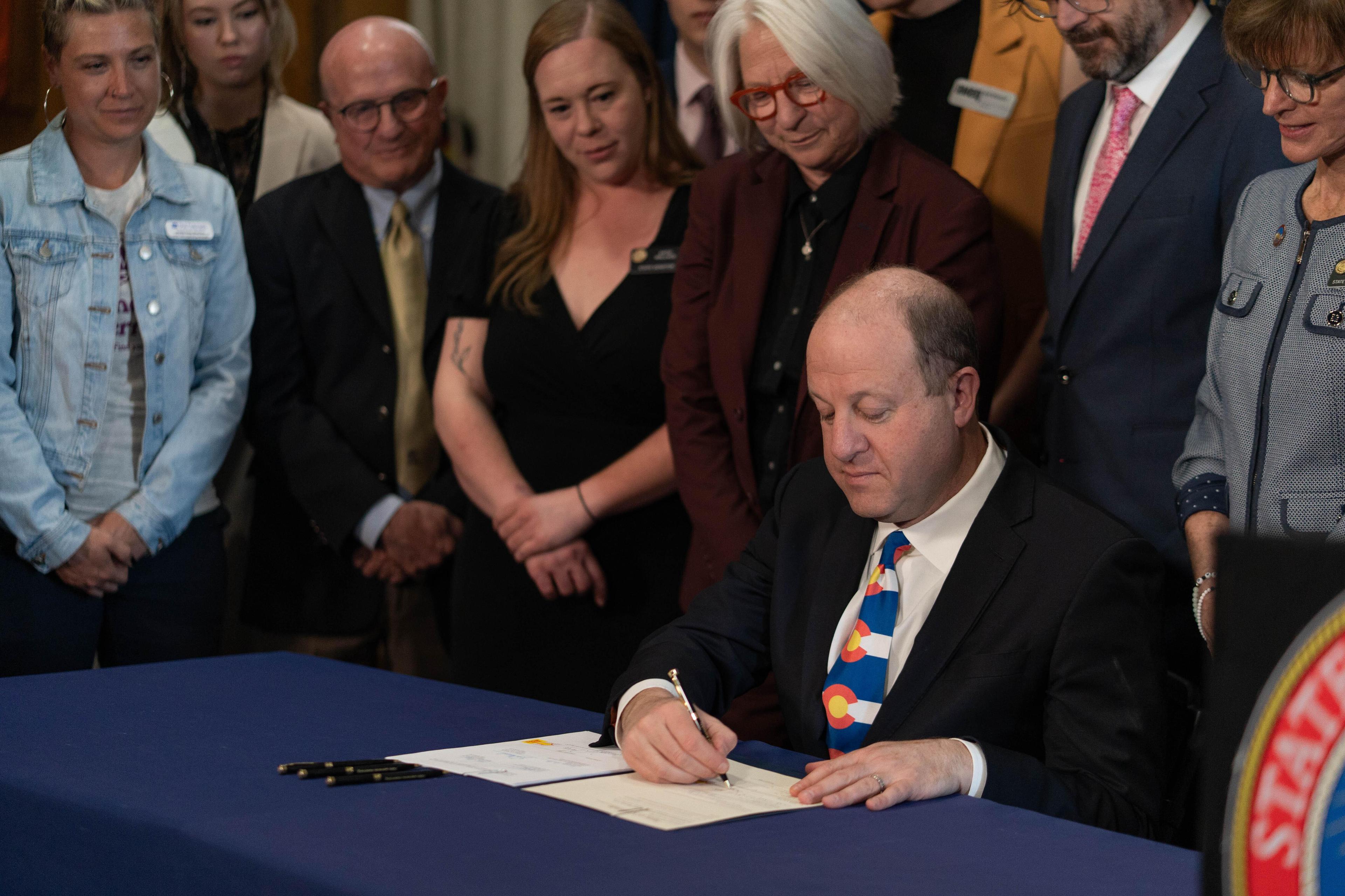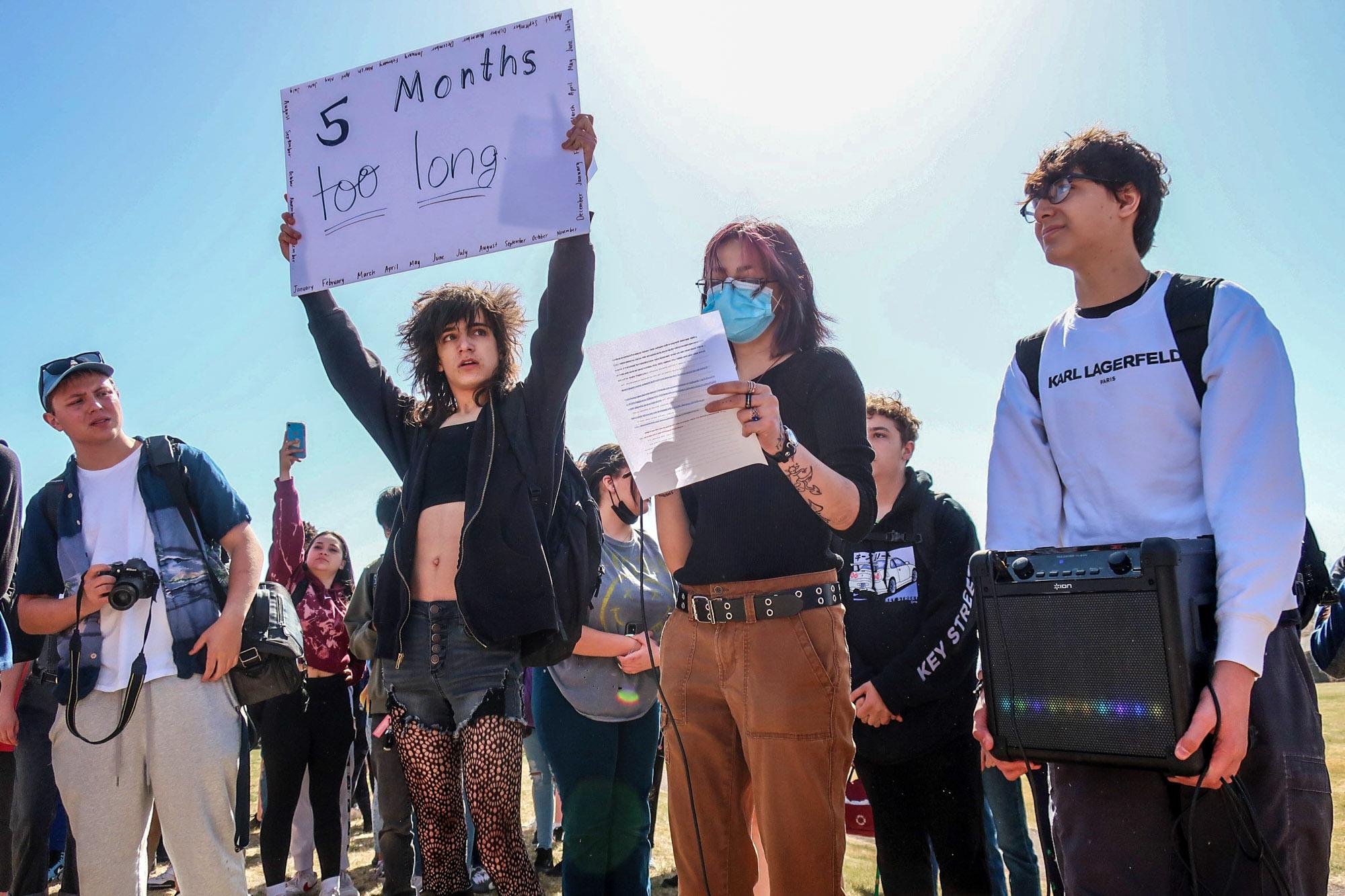
About 300 Grandview High students walked out of class Wednesday to support survivors of sexual assault — and to advocate for changes in federal law. The students streamed out of the school onto the athletic playing fields, chanting, “Five months? Too many!”
Five months ago, a female student made an allegation of sexual assault at the Aurora school against a male classmate and there has been no clear resolution of the incident. Students are frustrated that a Title IX investigation into the November incident is taking too long, especially when the accused still attends the same school, which has about 2,900 students.
“We walked out because we thought it would help create change and it would show on a larger scale that victims are supported here at Grandview,” said sophomore organizer Lauren Campbell.
The students were also protesting new Title IX rules enacted under the Trump administration, which they say delay closure on the alleged sexual assault at the school. They said the rules give too much protection to students accused of sexual assault and not enough to survivors.
“It’s failing to protect them and it’s giving too much to the assaulter, because honestly, it’s not creating a safe environment at school for the victim,” she said.
While this crowd of students protested, how states and the U.S. deals with sexual assault in education setting is also getting a closer look. In Colorado, two state lawmakers, prompted by student walkouts, want to make sure students know their rights and school districts are following federal law — which is also poised to change.
Though the Cherry Creek School District has not issued a finding in its Title IX investigation, the Arapahoe County district attorney charged the boy with a misdemeanor count of unlawful sexual contact, according to the Arapahoe County Sheriff's office. The case is in court.
The girl told school leaders a classmate had grabbed her crotch during a class project with three boys, according to a KDVR investigation of the incident. Prior to that, the girl told investigators, beginning in August 2020, the boy started, “Pulling my hair, push me in the hallways, touch my thighs, touch and slap my butt. She told him to stop on several occasions; however, he did not,” the KDVR report states.
Issues with Title IX
Students would like to see the district conclude its Title IX investigation and are upset the male student is still in school. In practice however, it’s quite common for districts to hitch their timeline to the criminal investigation, “or refer to an active criminal investigation as a reason for ongoing delays,” said John Shields with the national behavioral health nonprofit ETR.
For K-12 schools looking to address and prevent sexual and gender violence and assault, ETR can help provide resources and guides.
Some students said they understand the district is not able to order an immediate transfer of a student accused of sexual assault; they said their anger is directed toward the Title IX rules.
“Not being able to take action in cases such as this one, it really prevents survivors from speaking up and from thinking that their case is going to be taken seriously,” said 15-year-old Ella Barrett.
But others were more critical of the district.
"Expulsion proceedings are the standard, and the school district has yet to take an action as simple as transferring the student,” said student Angelina Bondarenko. “Can the district really claim to keep its students safe when their idea of urgency means waiting five months for action to be taken?”
According to Colorado law, a student can be removed from school and offered alternative education options if they’ve been charged with a criminal sexual offence and the school board determines that the behavior was detrimental to the safety, welfare and morals of other students, and whether keeping the student in the school provides a negative example for other students, among other reasons.
Title IX includes federal regulations aimed at protecting students against sex discrimination in learning environments. During the Obama administration, some believe guidance moved too far in believing survivors at the express of due process. However, many think the new regulations overcorrect that purported imbalance.
“The new regulations have also likely resulted in a chilling effect on reporting. Victims of harassment and assault are less likely to come forward in this new regulatory environment,” said Shields.
Under the Trump-era Title IX rules, colleges are now required to hold cross examinations and live hearings by adjudicators during sexual assault cases. They are also able to raise the evidentiary bar from “a preponderance of the evidence” to “clear and convincing,” which survivors groups argued made it harder to prove sexual misconduct.
The rules also changed how K-12 schools respond to students’ reports of sexual assault and harassment. It required administrators to more formally investigate claims. The evidence must be shared with accused students and their families. More time is given to the accuser to respond to complaints.
And there is a new, more restricted definition of sexual harassment. A complainant’s history of consent to prior sexual behavior could be offered as evidence of consent to the alleged behavior. That’s problematic to some, because it presumes consent for each instance of sexual behavior based on a history of consent.
The school must tell the students involved and their parents in writing about the allegations and the evidence gathered. It must give the accused person at least 10 days to respond. If the school decides to punish a student for the sexual assault allegation, it must tell the victim in writing.
“And so not only does that make the process longer but it also retraumatizes victims in their effort to prove their sexual assault,” said student Ella Barrett.
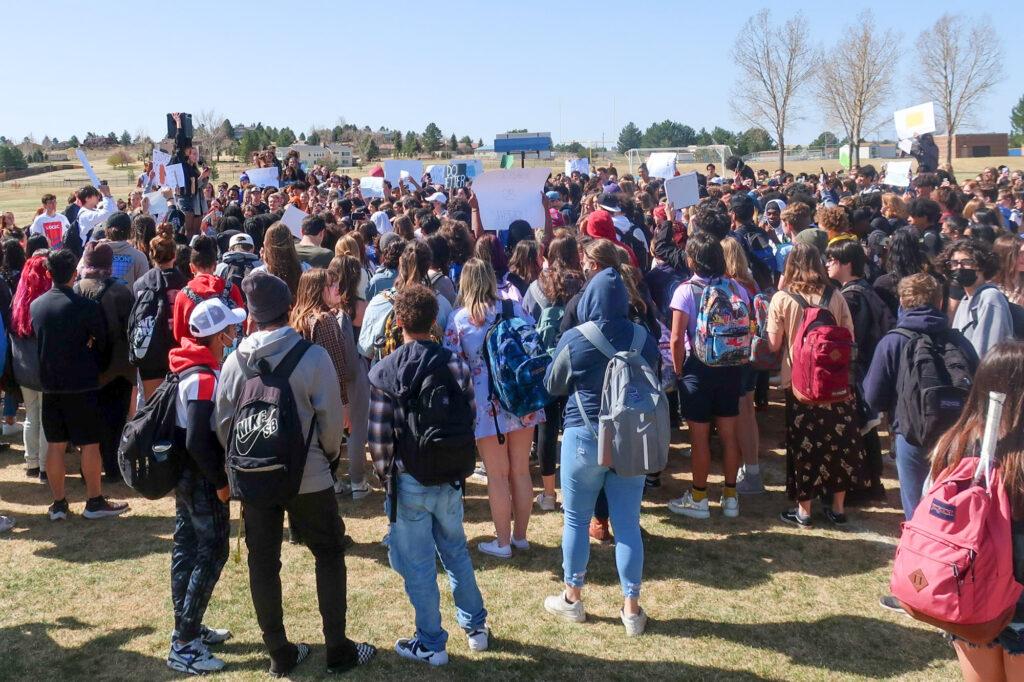
School district sends letter to parents
The Cherry Creek School District said in a statement to CPR News it is restricted by law from sharing student information or commenting on specific student matters and Title IX investigations.
“Cherry Creek School District takes all allegations of sexual harassment seriously and is committed to following applicable federal laws and regulations, including Title IX, as well as Cherry Creek School District board policies, to address all allegations of sexual harassment, the statement said.
In reference to the case of the female student, “the district said in the statement that it has followed both Title IX and CCSD Board policies.”
CCSD also works collaboratively with law enforcement, and within the parameters set in federal regulations to ensure a safe learning environment for all students,” according to the statement.
The district also sent a letter home to parents after Wednesday’s protest letting them know if their child needs support or feels they are being harassed, bullied, or discriminated against, to contact a school administrator. It provided the names of support organizations for sexual assault and healthy relationships including the Colorado Coalition Against Sexual Assault, the Blue Bench and Project Pave.
“At CCSD, we stand in solidarity with survivors of sexual assault, abuse and harassment,” the letter stated.
Change may be coming
The Biden administration has conducted public hearings as part of a sweeping review of regulations finalized under the Trump administration in 2020. The president campaigned to overturn the Title IX rule.
Education Secretary Miguel Cardona is charged with suspending, revising or rescinding the rules. The new draft rules are expected soon. That’s just the beginning of the rulemaking process. It could take 18 months at least to get a new, final rule.
In Colorado, a legislative bill was introduced this week that requires public schools to adopt a district policy in compliance with Title IX and provide it to the state department of education. That ranges from defining forms of misconduct to laying out procedures for reporting and investigating misconduct. The bill has its first hearing next Thursday.
Rep. Jennifer Bacon and Sen. Faith Winter said they saw student walkouts similar to Grandview’s recently and made note of the rising student advocacy on this issue. They began hearing from student coalitions from across the state — students complained about how difficult it is to find out what their rights are if they have been sexually harassed or assaulted.
“We have to make it clear, plain and open and public who a student or staff can call when it comes to Title IX issues,” Bacon said.
She said the state can’t change federal rules and regulations, but Colorado lawmakers can set the floor to ensure support services are easily found and clearly posted and students know who their school’s Title IX representative is. Bacon hopes the bill elevates awareness that students have protections.
“At the state level, we will ensure at the very least people know what their rights are and that these rights won't be concealed,” she said. “By concealing this information, we feel like we are concealing the legitimacy of the issues. And we want to do the opposite of that.”
Boulder Valley School District parent and community advocate Tracy Dundon supports the bill. She said compliance is not optional.
“We need more Title IX enforcement and proper training and education at the district level, which will help protect our students,” she said.
Students want more consistent classes on sexual assault, a culture change, and more readily available information on where to get help.
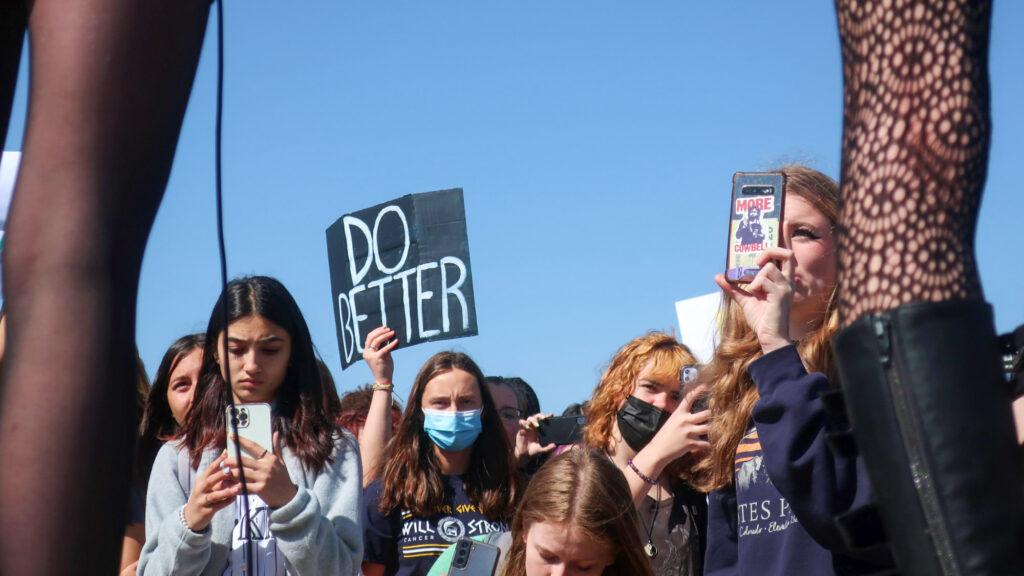
Back at the walk out
Ella Barrett said she’s taking a health class this semester, which includes lessons about relationships, sexual assault and domestic violence. She said she thinks the school is trying but the problem lies in the wider culture where sexual assault is not taken seriously enough. Even in her own health class she said, peers have said things like, “well, that’s not really sexual assault.” She thinks schools need to have more consistent and serious education, not simply “one semester of my sophomore year I learned we shouldn’t hit girls.”
Other students at the protest said they’d like to see their school make how to access sexual assault help lines more visible for students. Several students at the protest sobbed quietly, as their friends surrounded them.
“I know, as a victim of sexual harassment and sexual assault multiple times, it was really hard for me to come out here today,” said one student, who CPR has agreed to keep anonymous due to their age and the sensitivity of the topic. “But I knew I had to because I know so many people have gone through what I have gone through and I just want people to know they aren’t alone like I felt alone.”
A classmate asks if she wants a hug. After wiping away tears the girl said she was so “flippin’ happy” to see the crowd of students.
“It was so warming to know that so many people cared about this, way more than I thought did.”

